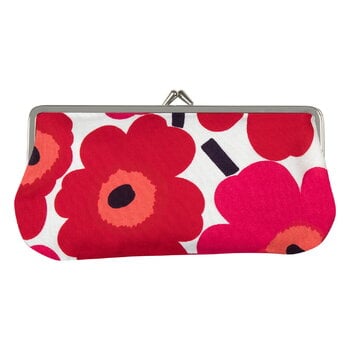Marimekko's Mini Unikko Silmälasi Kukkaro purse is decorated with an iconic flower pattern designed by Maija Isola. The versatile purse is ideal as a pencil case, wallet or eye-glass pouch, as well as for keeping other small essentials always within reach. The machine-washable Mini Unikko purse features a metallic frame that is easy to snap open, and its cotton fabric has been printed in Helsinki, Finland.
The Unikko pattern came about in 1964 after Armi Ratia, the founder of Marimekko, had announced in public that no floral fabrics are designed at Marimekko. Maija Isola did not accept rules or restrictions and designed in protest a complete collection of bold floral patterns: Unikko, a Finnish word that means poppy. Today, Unikko is one of Marimekko's best-known patterns and is recognized worldwide.




